The Brutalist Review: A Grand-Scale Immigration Story!
World War II and the Holocaust tends to be one of the most focused time periods in cinema when going back into American history. With so much pain, devastation, and suffering that is connected to this period of time, films focusing on the Jewish experience at the hands of Germany opened up many accounts and stories to authentically portray the horrors that occurred from the 1930s to the 1940s. Oftentimes, the aftermath of this devastation is viewed years and even decades later, (one example being Jesse Eisenberg’s current film “A Real Pain”), leaving the time period right after it ended to be a blank spot in cinema.
Related: “Nosferatu” Review – One of the Best Gothic Films in Decades!
The Brutalist, directed by Brady Corbet, tells the story of a Hungarian-Jewish architect, László Tóth (Adrien Brody), as he emigrates to America after surviving the Holocaust in search of the American Dream. Separated from his family, he is brought on to work by wealthy industrialist Harry Lee Van Buren (Joe Alwyn) to renovate his father Harrison’s (Guy Pearce) library. Thus begins a business and personal journey for László both recovering from the past and forging a future he has always dreamed of.
The Brutalist is a 3½ hr. historical epic that breaks away from a Holocaust focused narrative to explore one man’s fight for a new life in a country where persecution still continues. Corbet’s film is a carefully executed story of personal and societal struggle that is constructed just as beautifully as László architectural work. Corbet’s intricacies that he incorporates in The Brutalist’s script and direction showcase his fresh talent in developing nuanced characters that although may be victims of the Holocaust, become victims of their own choices in the wake of chasing their dreams.
László is never portrayed as a one track Holocaust survivor, having the audience sympathize with him throughout the course of the film solely because of what he’s been through. As he develops a heroin addiction that begins to affect his family in the second part of the film, László is seen as a human with flaws and aggression that further encapsulate the desire for more in a world that continues to push him down. As a result, the audience is able to watch László with a broader scope, seeing how he reacts to obstacles he faces from the Van Buren family and himself.
An incredible win for The Brutalist! 🌟
Congratulations on winning Best Picture – Drama at the #GoldenGlobes! pic.twitter.com/BNHytvfNyK
— Golden Globes (@goldenglobes) January 6, 2025
The Brutalist is one of the best representations of immigration in cinema. This expectancy of a better life in another country with more opportunities may be a possibility but Corbet explores the same disrespect and persecution that is faced socially even if physical persecution has come to an end. Although László is hired by Harrison Lee Van Buren, given housing, and even later the ability to bring his family over to the United States, he is always under the umbrella of Harrison’s orders and treatment.
Having such a high social standing, Harrison’s ego and birthright allows him to feel dominant over László despite László’s obvious intellectual and artistic superiority over Harrison. In this way, Corbet’s examination of the difficulty to achieve greatness in another country becomes evident seeing the power that wealth and familial legacy have in spite of those with strong determination and work ethic. The struggle to break the barriers of social persecution is one of the key factors discussed in The Brutalist deserving of praise.
The winner of Best Male Actor – Motion Picture – Drama is Adrien Brody in The Brutalist! 🍿🎥 Congratulations! #GoldenGlobes pic.twitter.com/i6kU9Xc2cp
— Golden Globes (@goldenglobes) January 6, 2025
One of the greatest ideas Corbet poses is the distinction between what one learns on their journey and the satisfaction of reaching their destination. We are often told the journey of heartache, and even triumph is what makes a human’s path worth it. However, in the face of historical destruction, such as the Holocaust, it is a wonder whether everyone feels this way. For survivors of traumatic events, the destination may be the saving grace that allows them to begin their journey of recovery, rather than the journey through abuse.
While some of the characters come to the conclusion of the destination being what it’s all about, Corbet’s inclusion of such a distinct sentiment allows his audience to grapple with a perspective outside of their own. The length of the film allows for a greater portrayal of László and his family along with a perfectly encapsulating score and production design that makes Corbet’s film a monumental achievement.
‘The Brutalist’ Rating – 4/5
Follow Steph (the Author) on IG – @cinemasteph_7
- Sinners Review: A Cinematic Spectacle! - April 23, 2025
- The Ugly Stepsister Review: A Fairy Tale in the Twilight Zone! - April 16, 2025
- SXSW 2025 Review: “Hallow Road” – A Twisted Road Trip! - April 3, 2025




